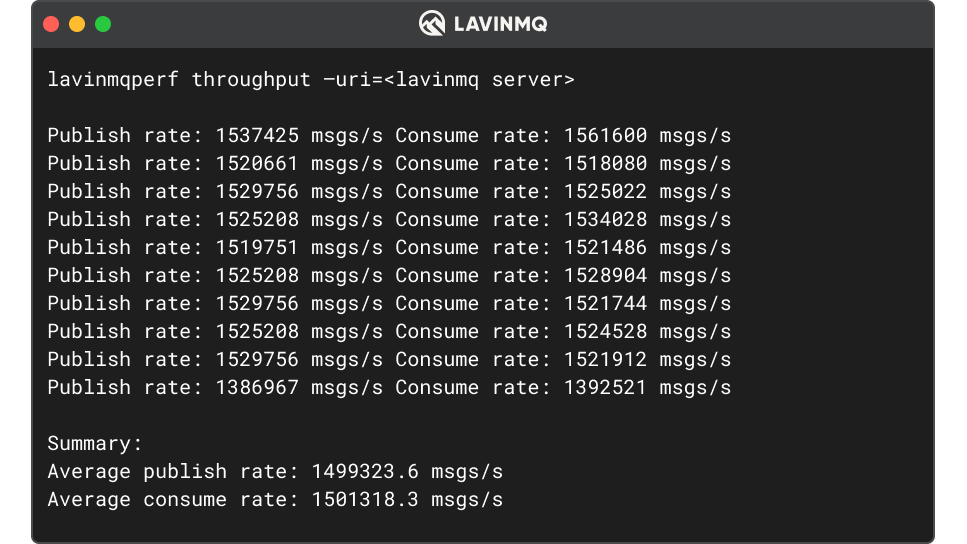 84codes LavinMQ:最高の性能を得るためのコードの理解
84codes LavinMQ:最高の性能を得るためのコードの理解 ニュース
OpenCollectiveを通じて、3つの簡単なステップでCrystalスポンサーになりましょう
貢献主要スポンサー
成功事例
 84codes LavinMQ:最高の性能を得るためのコードの理解
84codes LavinMQ:最高の性能を得るためのコードの理解  Bright Security Crystal:Brightにおける共通語
Bright Security Crystal:Brightにおける共通語  PlaceOS Crystalによるスマートビルの自動化
PlaceOS Crystalによるスマートビルの自動化 # A very basic HTTP server
require "http/server"
server = HTTP::Server.new do |context|
context.response.content_type = "text/plain"
context.response.print "Hello world, got #{context.request.path}!"
end
address = server.bind_tcp(8080)
puts "Listening on http://#{address}"
# This call blocks until the process is terminated
server.listen
Crystalは静的型付け言語であり、型エラーはコンパイラによって早期に検出されるため、実行時の様々な型関連エラーを排除できます。
しかし、強力な型推論のおかげで、型注釈はほとんど必要ありません。これにより、コードはクリーンに保たれ、動的言語のように感じられます。
def shout(x)
# Notice that both Int32 and String respond_to `to_s`
x.to_s.upcase
end
# If `ENV["FOO"]` is defined, use that, else `10`
foo = ENV["FOO"]? || 10
puts typeof(foo) # => (Int32 | String)
puts typeof(shout(foo)) # => String
nil値は特別な型Nilで表され、可能性のあるnil値はNilを含むユニオン型を持ちます。
その結果、コンパイラはコンパイル時に値がヌル可能かどうかを判断できます。nil値の明示的な処理を強制することで、恐ろしい10億ドルのバグを防ぐことができます。
foo = [nil, "hello world"].sample
# The type of `foo` is a union of `String` and `Nil``
puts typeof(foo) # => String | Nil
# This would be a type error:
# puts foo.upcase # Error: undefined method 'upcase' for Nil
# The condition excludes `Nil` and inside the branch `foo`'s type is `String`.
if foo
puts typeof(foo) # => String
puts foo.upcase
end
Crystalの構文はRubyから大きく影響を受けているため、自然に読みやすく、書きやすく、経験豊富なRuby開発者にとって学習曲線が低いという利点もあります。
class String
def longest_repetition?
max = chars
.chunk(&.itself)
.map(&.last)
.max_by?(&.size)
{max[0], max.size} if max
end
end
puts "aaabb".longest_repetition? # => {'a', 3}
Crystalは、ファイバーと呼ばれるグリーン・スレッドを使用して並行処理を実現します。ファイバーは、共有メモリやロックに頼ることなく、チャネルを介して互いに通信します(CSP)。
channel = Channel(Int32).new
3.times do |i|
spawn do
3.times do |j|
sleep rand(100).milliseconds # add non-determinism for fun
channel.send 10 * (i + 1) + j
end
end
end
9.times do
puts channel.receive
end
Crystalでは、Cライブラリ用のバインディングを定義し、それらに呼び出しを行うことができます。利用可能な豊富なライブラリエコシステムを簡単に利用できます。
既に優れたライブラリがあるタスクのために、プログラム全体をCrystalで実装する必要はありません。
# Define the lib bindings and link info:
@[Link("m")]
lib LibM
fun pow(x : LibC::Double, y : LibC::Double) : LibC::Double
end
# Call a C function like a Crystal method:
puts LibM.pow(2.0, 4.0) # => 16.0
# This example intentionally uses a simple standard C function to be succinct.
# Of course you could do *this specific* calculation in native Crystal as well:
# 2.0 ** 4.0 # => 16.0
class Object
def has_instance_var?(name) : Bool
{{ @type.instance_vars.map &.name.stringify }}.includes? name
end
end
class Person
property name : String
def initialize(@name)
end
end
person = Person.new "John"
p! person.has_instance_var?("name") # => true
p! person.has_instance_var?("birthday") # => false
Crystalライブラリは、中央リポジトリを持たない分散型依存関係マネージャーであるシャードにパッケージされています。
shard.ymlで定義された依存関係を読み取り、リポジトリからソースコードを取得します。
name: my-first-crystal-app
version: 1.0.0
license: Apache-2.0
authors:
- Crys <crystal@manas.tech>
dependencies:
mysql:
github: crystal-lang/crystal-mysql
version: ~>0.16.0
development_dependencies:
ameba:
github: crystal-ameba/ameba
OpenCollectiveを通じて、3つの簡単なステップでCrystalスポンサーになりましょう
貢献 84codes LavinMQ:最高の性能を得るためのコードの理解
84codes LavinMQ:最高の性能を得るためのコードの理解  Bright Security Crystal:Brightにおける共通語
Bright Security Crystal:Brightにおける共通語  PlaceOS Crystalによるスマートビルの自動化
PlaceOS Crystalによるスマートビルの自動化